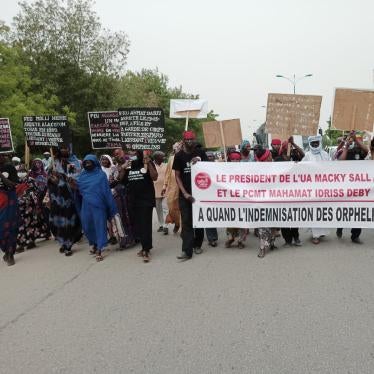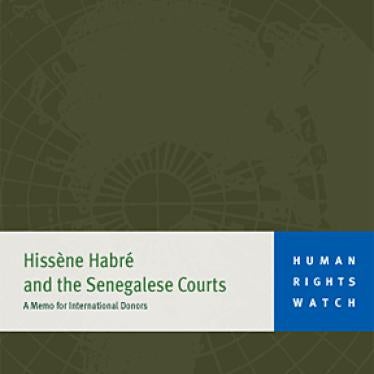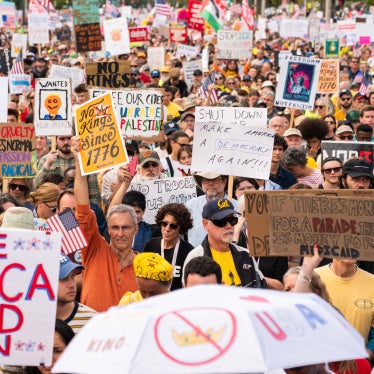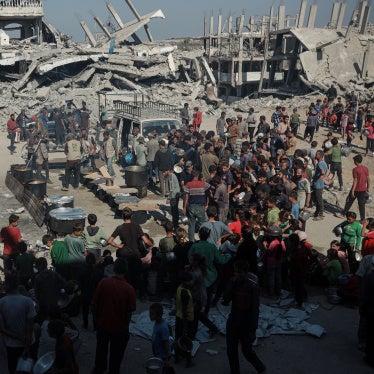Will the Chadian victims of Hissène Habré's regime finally achieve justice? After a successful donors' meeting to finance his trial in Dakar, and a curious legal decision by the ECOWAS calling for a special court to try the former dictator, the answer depends more than ever on the political will of Senegal, where Habré has lived since his fall 20 years ago.
On December 1st, 1990, when Hissène Habré was ousted from power in Chad and fled to Senegal, the doors of his prisons flung open and the survivors began their long odyssey to bring their tormentor to justice.
In January 2000, inspired by the London arrest of Augusto Pinochet, a group of victims led by Souleymane Guengueng, a former prisoner who had watched hundreds of cellmates die, went to Senegal to seek justice. To their surprise, a Senegalese judge indicted Habré on charges of crimes against humanity and torture. But, after government interference -which was denounced by two UN rapporteurs-appeals courts ruled that Senegal could not prosecute crimes committed outside of Senegal because it had not enacted legislation to implement its obligations under the UN Convention against Torture.
From Chad to Senegal via Belgium
Guengueng and the victims then turned to Belgium, whose universal jurisdiction law allows its courts to hear cases from all over the world. The Chadian government formally waived Habré's immunity and invited the Belgian judge to investigate the charges. The judge took copies of Habré's political police files, unearthed by Human Rights Watch, which provide a roadmap to Habré's repression and list 1,208 people who died in detention.
In September 2005, after a four-year probe, the judge indicted Habré. When a Senegalese court refused to act on Belgium's extradition request, Senegal asked the African Union (AU) to "indicate the jurisdiction which is competent" to try Habré.
Meanwhile, the UN Committee against Torture (CAT), following a petition submitted by Guengueng and other victims against Senegal, concluded in May 2006 that Senegal had violated the torture convention by failing to prosecute or extradite Habré, and enjoined it to establish its jurisdiction over Habré's acts and to bring Habré to justice in Senegal or to extradite him.
On July 2nd, 2006, after hearing from a panel of legal experts, the AU heads of state "mandated" Senegal "to prosecute and ensure that Hissène Habré is tried, on behalf of Africa, by a competent Senegalese court with guarantees for a fair trial" -and President Abdoulaye Wade declared that Senegal would finally do so. Senegal then amended its constitution and laws to give its courts competence over international crimes even when committed outside of Senegal.
The Senegalese amendments allowed the pursuit of past atrocities in conformity with the International Covenant on Civil and Political Rights (ICCPR), ratified by the UN in 1966. The constitutional amendment, which followed article 15 (2)of the ICCPR, said that the general rule of non-retroactivity shall not "hinder the prosecution, the trial and the sentencing of any person for any act or omission which, at the time when it was committed, was criminal according the rules of international law relative to acts of genocide, crimes against humanity or war crimes."
On the backburner
But over ten years since Habré was first arrested in Dakar, Senegal has yet to re-open proceedings against him. For years, Senegal insisted that it would not move forward until it received full international funding for all trial costs. Senegal put the costs at about € 27.4 million, one-third of which would go to reconstructing a courthouse. Meanwhile, potential donors insisted on a more credible budget.
President Wade then threatened to let Habré leave the country unless the international donors come up with the funds. Fearing Habré's flight, Belgium started proceedings at the International Court of Justice in The Hague in February 2009, asking that Senegal either prosecute or extradite Habré to Belgium and sought provisional measures barring him from leaving Senegal pending the ICJ's final judgment. In May that year, the ICJ accepted Senegal's formal pledge that it would not allow Habré to leave Senegal pending the Court's verdict. ICJ's final decision on the case is expected sometime in 2012, although Belgium would most likely drop the proceedings if and when Habré's trial in Senegal starts.
In July this year, Nobel Peace Prize winner Bishop Desmond Tutu and 117 African human rights groups from 25 countries called for Senegal and the AU to speed up preparations for the trial.
In the meantime, the AU and the European Union intensified negotiations with Senegal over a budget. The AU has recognized that -as it opposes the arrest warrant against Omar al-Bashir- the Habré case provided an opportunity to show that African courts can deal with African crimes. Finally, an agreement was reached on a US$11.7 million (€8.59 million) budget for a 20-month investigation and a five month trial.
A donors' meeting in Dakar on November 24th saw pledges which slightly exceeded that amount, led by Chad (€3 million), the EU (€2 million), Belgium and the Netherlands (€1 million each) and the African Union (US$1 million).
ECOWAS ruling
Five days before the Donors' meeting, however, a strange ruling from the Court of Justice of ECOWAS (Economic Community of West African States) - a regional group of sixteen countries - threw a curve ball at the proceedings. Habré had seized the court in an attempt to block his trial, accusing Senegal, inter alia, of violating the principle of non-retroactivity by passing new legislation as requested by CAT and the AU legal panel.
Without citing CAT or the UN Convention against Torture, the Abuja-based Court decided to seek a balance between the "noble objectives" of the AU mandate to try Habré and the "methods which international law generally undertakes" in such situations. It cited article 15(2) of the ICCPR, but rather than giving it direct effect, said that it must be applied "according to international custom which has a habit in such situations of creating special or ad hoc jurisdictions."
It then misquoted the key words of the AU mandate, saying that when the AU used in its mandate "the expression ‘...competent court...'" before which Habré should be tried, this only meant the setting up of an ad hoc legal framework. The AU mandate did not use the expression "competent court," however, but the expression "competent Senegalese court." Indeed, the AU legal panel studying options for Habré's trial in 2006 had noted that an ad hoc court would "cost a lot of money and create further delay in the trial of Habré."
The ECOWAS Court concluded that the obligation to combat Habré's impunity had to be carried out "within the strict framework of a special or ad hoc procedure of an international character as practiced in international law by all civilized nations."
The donors in Dakar insisted in their final document that "it is more important than ever that the procedure begins very rapidly without further delay," and called for "the immediate launching of the prosecution phase of the case once the necessary resources for the launch have been mobilised."
The AU envoy to the Habré case, Robert Dossou, was openly critical of the ECOWAS ruling, while the Senegalese justice minister remarked that Senegal was bound by both the ECOWAS decision and the AU mandate, and asked the AU to resolve the question.
In the view of many the ECOWAS decision, despite its flaws, actually offers an opportunity to create a more cost-effective jurisdiction with limited competence (to try "the most serious accusations")more tailored to the needs of the trial of a former president.
The key will be to keep the new jurisdiction cost-neutral, given how hard it was to come up with even $11.7 million.
Everything now depends on the political will of Senegal. It can use the ECOWAS decision to stall further or to propose an expensive scheme which will never get off the ground. Or it can take advantage of the decision to move swiftly towards the trial which the victims have sought for 20 years.
ICJ Judge Antonio Cançado Trindade lamented the gap between "the time of human beings and the time of human justice." "For those victimized," Cançado wrote, "the passing of time without justice is painful, as it is time leading to despair. ....The surviving victims of the atrocities of the Habré régime keep on waiting for justice. Hope is the last one to vanish."
Reed Brody, Counsel and Spokesperson for Human Rights Watch, has been working with Habré's victims for 12 years.







